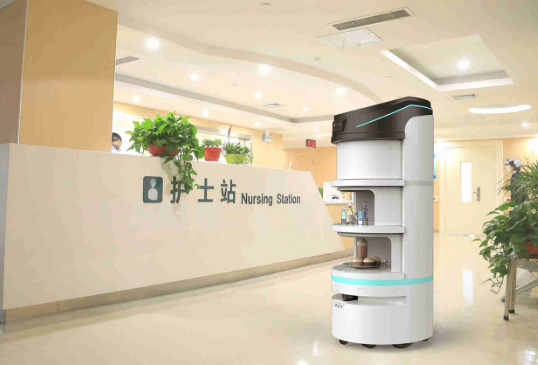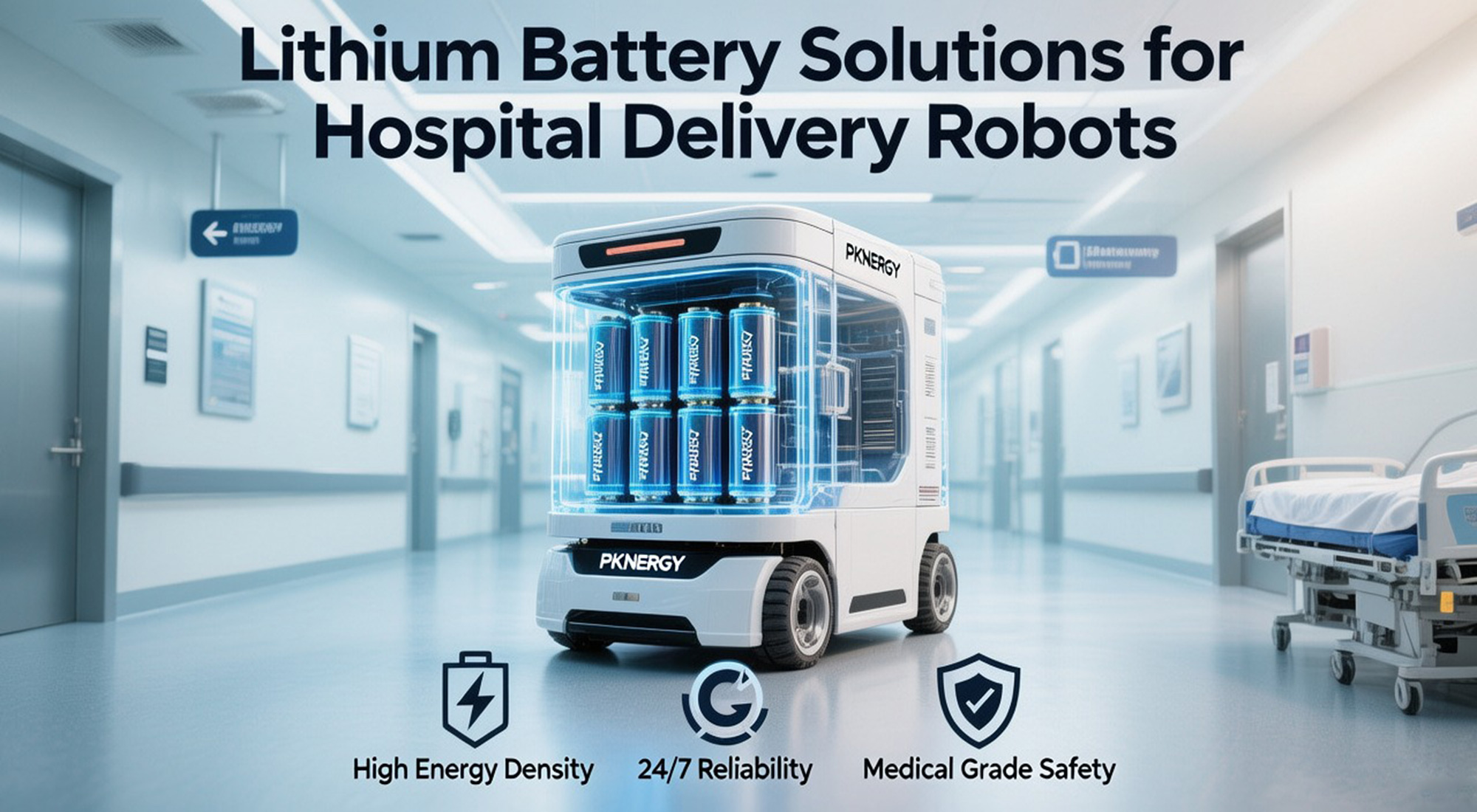Lithium Battery Solutions for Hospital Delivery Robots
Reliable, Medical-Grade Power Systems for Smart Healthcare Logistics
1. Introduction
Hospital delivery robots are rapidly transforming modern healthcare operations. They autonomously transport
medications, meals, linens, lab samples, and medical supplies across different departments, reducing staff
workload and improving operational efficiency. To achieve smooth, safe, and uninterrupted service within
clinical environments, these robots rely on highly stable and hygienic power systems. :contentReference[oaicite:1]{index=1}
SHENZHEN PKNERGY ENERGY Co., Ltd. specializes in custom lithium battery solutions designed specifically
for hospital delivery robots, ensuring long runtime, reliability, and medical-grade safety.
2. Application Background
Hospital delivery robots require intelligent power systems capable of supporting continuous movements, elevator
communication, real-time navigation, and wireless connectivity. They operate within strict safety, hygiene,
and reliability requirements. Key technical power demands include:
- Long runtime for full-shift operation (8–20 hours)
- Fast charging for continuous circulation during peak periods
- High discharge current for motor-driven mobility
- Stable voltage for sensors, cameras, LiDAR, and AI processors
- High cycle life for daily multi-shift charging
- Low noise and low-heat operation to meet medical environment standards
- BMS systems compatible with hospital IoT networks
Common challenges include reduced runtime from inferior cells, overheating during long-distance movement,
difficulty integrating large-capacity packs, and communication failure between the robot and the battery system.
PKNERGY resolves these issues with healthcare-grade battery engineering. :contentReference[oaicite:2]{index=2}
3. PKNERGY Battery Solutions for Hospital Delivery Robots
PKNERGY provides customized lithium battery packs engineered for medical service robots requiring 24/7 reliability.
3.1 Chemistry Options
- Li-ion (18650/21700) – High energy density and compact size
- LiFePO₄ Packs – Maximum safety and long cycle life (2000–3000 cycles), ideal for medical robots
- High-power Li-polymer – Excellent performance for lightweight, agile delivery robots
For related products, see:
• Custom Lithium Polymer Battery
3.2 Electrical Specifications
| Parameter | Specification |
|---|---|
| Nominal Voltage | 24V / 36V / 48V (customizable) |
| Capacity Range | 20Ah – 80Ah+ |
| Continuous Discharge | 2C – 5C for motor-driven applications |
| Optional Configurations | High-voltage packs for large hospital logistics systems |
3.3 Smart BMS Features
- Overcharge / over-discharge protection
- High current protection for motor acceleration
- MOSFET-based safety architecture
- Temperature monitoring (NTC sensors)
- Active / passive cell balancing for longevity
- CANBus / RS485 / UART communication
- Optional SOC display module for precise power indication
3.4 Mechanical & Structural Design
- Medical-grade casing options
- Anti-vibration and shockproof design
- Fire-resistant ABS / metal enclosures
- Custom connectors, wiring harnesses, and mounting brackets
- Optional IP54–IP67 waterproof / dustproof protection
3.5 Certifications
- UN38.3, MSDS, IEC62133, UL1642
- CE / RoHS compliance for medical facility use
For broader medical applications, you can also refer to:
4. Value to Buyers, Engineers, and Project Managers
PKNERGY provides full-stack engineering support tailored to hospital robot OEMs and integrators: :contentReference[oaicite:3]{index=3}
- Fast prototype sampling within 10–15 days
- Low MOQ for early-stage R&D projects
- Complete OEM/ODM battery customization
- A-grade cell sourcing for long-term consistency
- Automated production for stable quality
- Comprehensive reliability testing for medical-grade environments
These advantages help manufacturers accelerate product development, improve reliability,
and reduce battery-related maintenance costs.
5. Case Study: Hospital Robot Manufacturer in Europe
A European smart healthcare robotics company required a highly stable, long-life battery system
for its new medical delivery robot. PKNERGY developed a 48V 50Ah LiFePO₄ pack with CANBus communication. :contentReference[oaicite:4]{index=4}
Results
- Achieved 16–18 hours of runtime per charge
- Reduced heat generation to meet hospital standards
- Real-time battery diagnostics via CANBus improved operational planning
- Battery cycle life exceeded 2500+ cycles, reducing long-term replacement cost
6. Why PKNERGY
- 20+ years of lithium battery customization experience
- Proven success in medical robot, AGV, and AMR power systems
- Automated production lines ensuring high consistency
- Engineering team specializing in smart mobility and medical devices
- Full certification support for global shipments
For more solutions on AGV and AMR, please visit:
FAQ
What voltage is most common for hospital delivery robots?
Most medical delivery robots operate on 24V, 36V or 48V lithium battery systems depending on motor power and runtime requirements.
PKNERGY can customize voltage and capacity based on your design.
Can PKNERGY integrate CANBus or RS485 communication?
Yes. Our smart BMS supports CANBus, RS485, or UART communication, enabling real-time monitoring of SOC, SOH, current, voltage and alarms.
Are these batteries suitable for 24/7 operating robots?
PKNERGY designs lithium packs with high cycle life, fast charging capability, and robust BMS to support multi-shift, continuous operation.
Do you support small trial orders for new projects?
Yes. We support low MOQ and fast sampling to help OEMs validate robot performance before large-scale deployment.
Contact Jennifer — PKNERGY
Looking for a safe, reliable, and long-life lithium battery solution for hospital delivery robots or medical service robots?
Get in touch with Jennifer for technical support and quotations.
Email: sale3@pknergy.com
Tel / WhatsApp: +86 138 2359 8934
Website: www.pknergy.com


